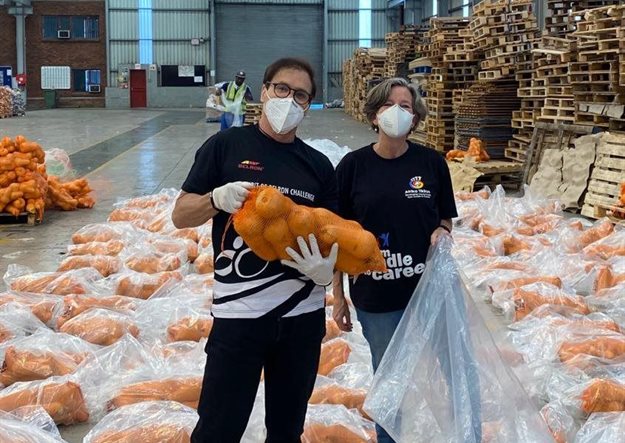
Focusing on global philanthropy in part one, viewers heard from Christopher Holder of the Holder family and Marc Lubner, CEO of Afrika Tikkun and head of the Lubner family, on how they have seen their worlds change as a result of Covid-19 and how philanthropists may move forward post-pandemic. With the variations in culture, politics and history from one country to the next, Afrika Tikkun asked how the focus of philanthropy may begin to shift in order to address inequalities in a more strategic way.
In the webinar, Lubner said, “What Covid has done is brought the issue of poverty to the top of the agenda – everywhere.” In many cases, it turned the efforts of non-profit organisations upside down. For instance, Afrika Tikkun’s core efforts relate to services in education and youth development, but Covid-19 meant they had to close their centres to students and start seeing to their basic needs and that of their families.
"We’ve had to become much more geared up towards food security. Where before we made 1.8 million meals at our centres and could distribute them at our centres, now we’ve had to necessarily provide some 70,000 families with a month’s supply of food and find new delivery systems.”
He added, “We also have to address a much broader audience than just those kids who were coming to our centres. We’ve got to take our Cradle to Career 360° model - this concept of developing from an early stage through successive life phases to where we ultimately get youth into jobs and/or businesses of their own – we now have to expand that and consider other factors like what’s happening with the rest of their families.”
The speakers acknowledged three main attributes that have allowed them to pivot their strategy toward saving lives.
Moderator, Gary Lubner of Belron advised, “What I’m hearing a lot of from investors, etc., is that they are looking at businesses now to see how they responded during the crisis. How agile were they? How flexible were they? And once we do come out of this, it's going to be those organisations that showed the most agility and flexibility that will retain investors and attract investors of the future.”
Holder also commented that, “When the dust settles, the projects that we originally agreed to support will still need to be implemented, so the next element we have to look at - and that will potentially put a big hole in your grant-making in the months, or even the next year to come - is how funds will be redistributed by philanthropists.”
This agility not only relates to day-to-day operations, but also how NGOs link up with donors. Without having that typical social interaction, Holder says that, “NGO’s will have to find different ways of connecting with donors.”
The take-out: Those capable of adapting will survive.
Marc Lubner also said, “We are carving new pathways of collaboration. The future is going to have to see a partnership between government, business and NGOs. And NGOs should be partnering on initiatives and delivery if we are to optimise impact.
In terms of corporate investment, Holder warned, “The other thing you’ve got to think about is that funders have to have a capital base to give donations. Their earning potential is also compromised at this time, so they may not be able to give as much over the next few years.”
Everyone agreed that the world will not revert back to what we once knew, and as we contemplate the world post-pandemic, Lubner asked, “Is the new normal going to be a world that will become a more sensitive and receptive place?”
Lubner mentioned that technology has the ability to both disrupt and innovate. Whilst Afrika Tikkun NPC has focused their Covid-19 activities around food security relief schemes in various communities, partnering with Uber and Boxer Superstores to provide food vouchers for their drivers in a time of need saw the two organisations develop a paperless, automated voucher system.
At the same time, Afrika Tikkun Services has focused on the digital delivery of educational materials, digitising study materials for e-learning and assisting with the tools necessary, such as smartphones and data. This shift online is a move toward sustainable infrastructure for the future.
Lubner concluded, “Afrika Tikkun brings the community together. Now help us bring tech to our youth and help us bring tech futures to our children.”
Over the next few weeks, Afrika Tikkun will chat to thought leaders in business and technology as they further address challenges and necessities for transformation.